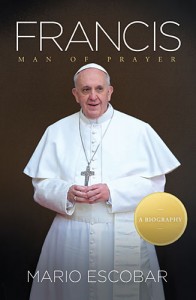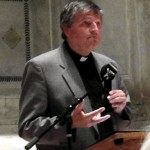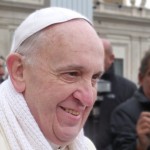“In the Christian life, even in the life of the Church, there are old structures, passing structures: it is necessary to renew them! … The Church has always done this! From the very first moment, we remember the first theological battle: was it necessary to carry out all of the Jewish practices in order to be Christian? … And so the Church always goes forward, giving space to the Holy Spirit that renews these structures, structures of the churches. Don’t be afraid of that!” — Pope Francis at mass on Saturday morning, as reported by the Vatican Radio website
When Pope John Paul II took power in 1978, his Polish Catholic roots brought with them deep-seated social traditionalism and strong anti-socialism, resulting in a Vatican that turned hostile towards liberation theology and lukewarm towards the Vatican II reforms. This continued through Pope Benedict, who had been John Paul’s enforcer of dogma. If you’re a social and political conservative, you might think these last 3+ decades of the Church “undoing” parts of Vatican II, waging war on liberation theology, digging in its heels on the role of women, and acting, some would say, without Christian charity towards homosexuals and those with a different view on life were God’s Will unfolding. But if so, then what to make of the election of Pope Francis, a Latin American Jesuit, followed almost immediately by a Vatican official saying the war on liberation theology is over and calling it one of the most significant contributions to theology in the past century? Francis, who told regional church leaders not to let opinions from the Vatican dogma enforcers dissuade them from their mission? And who, just last week, moved the elevation to sainthood of Pope John XXIII, the creator and personification of Vatican II, off the back burner where it had languished ever since conservatives gained power, and bent the rules to fast-track it.
In light of Pope Francis’ similarity in demeanor to Pope John XXIII, his admiration for the gentle, plainspoken pastoral leader, and his quick sainting of the Vatican II architect, you can’t help wondering, as the new book Francis: Man of Prayer asks: will Pope Francis be a reforming pope? Will he, like John XXIII, instigate changes that will alter the course of the global church profoundly and extend beyond his own papacy?
While Pope Francis has given many indications that he will change the papacy, the quote above suggests he might be heading towards reforming the Church as well. Those who like things just the way they are thank you very much are quick to write off Francis’ early actions in one of two ways: either that he’s inexperienced and speaking off-script and things will quiet down once he learns how to be pope; or that it’s not really a change in direction, only style — Francis is simply more inclusive and social by nature, but his beliefs are in line with the recent past. Some even cynically paint it as a calculated move to put a friendlier face on the existing dogma.
If you’ve tried to learn who Francis is through the early reports in Western media, you will be confused. For the most part, the media has leapt hopefully on any indication Pope Francis will be more liberal than his predecessor, but it has also reported the sensational accusation that he was a collaborator with the conservative military dictatorship in Argentina and complicit in the arrest of some liberation theology-sympathizing Jesuit priests — and that despite being a Jesuit, he’s really not liberal at all.
The first half of Francis, written by Mario Escobar and just published by Thomas Nelson, gives a broad background on the new pope, his two predecessors, the Jesuit order, Latin American liberation theology, and papal power structures and election processes. This will be very helpful to the average reader. Also, it’s an unfortunate necessity that part of Francis is devoted to defending the new pope against those charges that he didn’t do enough — or worse — against the right-wing government in Argentina. Francis does a solid job of all this, though someone who’s already a Vatican-watcher will find little new in this part of the book.
Returning to Vatican II?
If you are a liberal Catholic, you are likely to experience Pope Francis’ early actions not as anomalies or errors, but as a return — an undoing of the undoing of the Church’s liberalization, if you will. His friendly engagement with the modern world, his pragmatic interplay with thorny social issues, and his willingness to discard traditions that aren’t working or serve no mission all embody Vatican II’s ethos and specifics.
In this long view of history, Jesuits and American nuns have been not disobedient renegades but rather the keepers of the flame through these recent dark decades. It has often been this way — that while Vatican and diocesan bureaucracies move in a direction dictated by worldly interests or some theological trend, those removed from the politics, often in religious orders, keep the faith, ready to offer it back to the Church when the diversion has run its course.
Is that what’s happening here? Is this a major shift?
Once Francis has looked at the person and his location in historical and global contexts, it gets down to the details of attempting to predict what kind of pope he’ll be. The book starts by jumping right into some key issues he faces: the pedophilia scandal, Vatileaks, the global rise in acceptance of gay marriage, and the drop in Church attendance and new priestly vocations.
Of course we can expect continued reforms and corrections in response to the pedophilia and corruption scandals, as Francis indicates. (The nature of the book form means it can’t be entirely up-to-date, though — for example, the resignations of the Vatican Bank’s leaders which happened in recent days.) The book skips too briskly through abortion and homosexuality, however, stating generally that Francis’ views are in line with Church teaching and quoting from Benedict-era Vatican statements to outline those. This seems to me to miss the mark. There’s no mention of his endorsement of civil unions in Argentina as an alternative to gay marriage — something unimaginable from the U.S. bishops or the last two popes. And a quote included from Francis objecting to gay adoption nevertheless hints at something more interesting: “If there is a private union, there is no third party nor is society affected. Now…” In that preamble, he seems to be saying that society is not affected negatively at all by gay unions. Similarly, with abortion, Francis says the pope’s views are in line with Church teaching, but then it seems to hint at more — in this case, his saying that abortion is not a religious issue but an ethical one — without exploring the issue further. Four pages to cover homosexuality and life issues is simply not enough. Perhaps there just wasn’t more to draw from existent sources, but it feels inadequate.
On the drop in priestly vocations and Church membership, there is much more. Two classes of people are blocked completely from entering the priesthood: women and openly gay men; another is held away by the choice to marry. While many have been talking for decades about the need to change these limitations — either because the rules are invalid or for purely pragmatic reasons to make the priesthood more accessible — there has been a virtual taboo on the issue in the official church because traditionalists see any discussion as a slippery slope leading to (God forbid!) women priests.
Francis says:
“Pope Francis is not closed off to the idea that at some point the celibacy requirement for priests might change. He believes that the discipline of celibacy will continue but should be formulated for cultural reasons, not as a universal option. His words seem to leave the subject only somewhat open-ended. Thus he says that celibacy is a matter not of faith but rather of discipline. It has been enforced by the Catholic Church since the year 1100. The pope’s exact words on the topic are, “It might change.” This is, at least, much further than other members of the Catholic hierarchy, who will hear and speak nothing on the matter, have gone.”
The drop in Church membership has been especially pronounced in Latin America in recent years, and Francis attempts to place the new pope firmly in the trajectory of his predecessor’s New Evangelization effort. But while both may see the need for the Church to engage the culture more, I suspect that the ways in which Pope Francis would encourage this will look profoundly different from the way Benedict’s allies in Latin America have been combatting evangelical Protestantism as an enemy. Also, Francis concedes, “Catholic-Muslim dialogue has been stymied for several years, especially after Benedict XVI’s polemical speech in Ratisbona, in which he paraphrased a Byzantine criticizing Mohammad.”
Like most books from within the Catholic mainstream, Francis tries to put a positive spin on all previous and current popes’ actions, and insists that Francis exists in a non-contradictory contiguous thread, stating at one point, “In many instances… Pope Francis’s postures will be similar to those of his predecessors.” In effect, the book tries to say Pope Francis is entirely consistent with Popes John Paul and Benedict, but will undo many things they did. I forgive the inconsistency as something of a necessary evil with such writing, though it can be frustrating at times. In the concluding chapter, Escobar is more blunt:
“Jorge Mario Bergoglio is a pope for a new century. In many ways Benedict XVI was a roadblock for the Catholic Church trying to find its way toward modernity.”
More than pragmatism
Progressives who’ve responded warmly to Pope Francis’ early actions as pope may be surprised to learn how conservative he is on some social issues. Nevertheless, there is tremendous movement possible relative to his two predecessors thanks to his pragmatism. No. Pragmatism is the wrong word. Take for example, as has been reported, how while archbishop of Buenos Aires he supported secular civil unions in Argentina as an alternative to legalizing gay marriage. This is not enough for those who want the Church to reverse its basic position on homosexuality, but it’s a far cry from the hostile stance many church leaders have taken, such as the U.S. Conference of Catholic Bishops’ snippy press release immediately following the Supreme Court’s striking down of DOMA, calling it a “tragic day for marriage and our nation.”
No, what drives Pope Francis is more than pragmatism. It’s having a feel for which issues to engage, and when to respect others’ freedom. And it is, more broadly, having an inclusive rather than a combative manner. Again we’re in that gray area between style and substance. In Francis, a pilot who knew the pope when he was archbishop is quoted as saying he “respects his neighbors and is always open to learning.” Yes, this is style, but it is much more than that. Pope Benedict was a leader who took on opponents; who did intellectual battle; who used the mechanisms of power to suppress those with whom he disagreed. Pope Francis seems more like a leader who doesn’t worry about the politics. This might lead him into conflict with others sometimes, but he is not seeking conflict.
And if change is to come, not all of it need come directly from actions by Pope Francis. There’s a lot of pent up energy out there. Pope Francis’ style may embolden some already in leadership who’ve been cowed into silence for over three decades. For example, the Vatican official who declared the war on liberation theology over. Within weeks of Francis’ elevation to pope, the German Bishops’ Conference chair, Archbishop Robert Zollitsch, said the conversation about whether women could be deacons was “no longer taboo” and that remarried divorcees should be allowed to take communion and be involved in church leadership.
Talking about the big issues is not to say that the stylistic stuff doesn’t matter on its own too. Pope Francis’ open, loving and pragmatic interplay with the modern world is a stark contrast with his predecessors. John Paul II and Benedict were both removed from the regular world. As Escobar puts it, Pope John Paul II “always maintained a more paternalistic attitude and upheld an image of strength and perfection that made it difficult for common people to follow his example”; and Pope Benedict was “an intellectual focused on books and enamored by ancient papal ceremonies.” Benedict was also enamored by the regal trappings of papal status.
In stark contrast, Pope Francis has rejected regal trappings wherever he can. His simplicity and humility remove all barriers with the outside world. He is eating meals with lay people (an early scandal of his papacy — a silly tradition has held that people shouldn’t see the pope eating anything but the Eucharistic host), celebrating daily mass with Vatican workers, and spurning the papal suite and country castle in favor of relatively modest apartments meant for guests. These changes are more than show; they affect the world’s relationship to the papacy.
And Pope Francis’ openness and willingness to engage and show respect to those outside the faith is more than style; his recent statement that “dialogue doesn’t distance us from Truth” has profound implications. Few (except for some of the “new Atheists”) expect religious leaders to change their views. In fact, I think many look to faith leaders to help us out of the morass in which we find our society. What they ask for is not identical views, but openness to dialogue and collaboration. Pope Francis promises to be such a leader.
Francis concludes by hitting on a number of other topics concerning the new pope: how the Jesuits’ traditional emphasis on the preferential option for the poor will shape Francis’ papacy; social media and how, in stark contrast with his predecessor, Francis already had a Twitter feed and Facebook page before becoming pope.
Humility in prayer and meditation
One of these chapters is key to understanding Pope Francis and how being from a religious order that focuses heavily on prayer and meditation shapes him. He has said that individual prayer is one of the pillars of the priesthood.
Anyone watching on TV when Pope Francis appeared for the first time after being elected will remember that he did two remarkable things concerning prayer. He asked people to pray for him despite his being their leader, and he asked all watching — around the world — to join him in silence. To Pope Francis, contemplation is an integral part of humility because when you pray and meditate, you are just yourself — no lies, no ego, no image, no excuses — before God.
Francis: Man of Prayer adds that the new pope has said prayer is a model of giving of oneself — to God and the moment — separate from any idea of giving or possessing material things. It also notes that he caused some controversy in Buenos Aires when he gladly prayed together with Protestants at Protestant services. One headline read, “Archbishop Commits Apostasy.” To which he responds in typically endearing bluntness, as quoted in Francis:
“For them, praying together with others was apostasy. Even with an agnostic, from his or her place of doubt, we can look upward together and seek transcendence. Each one prays according to his or her tradition. What’s wrong with that?”
In the end, Francis: Man of Prayer cannot answer the big questions because only time will tell what is in store. However, for anyone interested — whether as an onlooker or a concerned Catholic — in Pope Francis as a man and leader, and how his papacy will affect the course of the Church, Francis has some answers and many questions — plenty to satisfy the curious reader.













